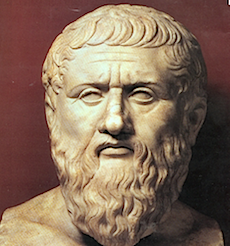Plato: Difference between revisions
(→Video) |
|||
| Line 15: | Line 15: | ||
==Additional resources== | ==Additional resources== | ||
===Articles=== | ===Articles=== | ||
*[ | *[https://www.theosophy.world/encyclopedia/plato Plato] in Theosophy World | ||
===Audio=== | ===Audio=== | ||
Latest revision as of 15:52, 22 November 2023
ARTICLE UNDER CONSTRUCTION
ARTICLE UNDER CONSTRUCTION
Plato (428/427 or 424/423 – 348/347 BC) was an Athenian philosopher during the Classical period in Ancient Greece, founder of the Academy, the first institution of higher learning in the Western world. According to H. P. Blavatsky he was an Initiate into the Mysteries and the greatest Greek philosopher.
C. Jinarājadāsa comments
C. Jinarājadāsa spoke of Plato as having been a great influence on his life:
As far as the West is concerned, ever since Plato wrote, wherever there is any kind of philosophical thought which deals with civilization or tries to understand the principles of art, every political writer and every exponent of art has more or less to follow Plato's trail. While you may differ from Plato in various ways, fundamentally you have to ally yourself with him on those thoughts.[1]
Additional resources
Articles
- Plato in Theosophy World
Audio
- The Esoteric Plato by Renee Weber
Video
- Turning-Points for the West: From Pythagoras and Plato through Gnosticism and Neoplatonism by Stephan Hoeller and Tony Lysy, presented on September 11, 2004 at the Theosophical Society in America.
- All About Platonism series by Mindy Mandell.
- Transformation. Added January 31, 2022. 28 minutes.
- Things in Themselves. Added December 6, 2021. 27 minutes.
- Dialectic. Added January 17, 2022. 17 minutes.
- Menexenus. Added April 12, 2021. 24 minutes.
- Purification. Added February 7, 2022. 29 minutes.
- Plotinus 1:6 Beauty. Added January 24, 2022. 27 minutes. Discusses Neoplatonism.
- 12 Gods of the Phaedrus. Added January 10, 2022. 13 minutes.
Websites
- Resources on Plato at Universal Theosophy
Notes
- ↑ C. Jinarājadāsa, "Ruskin - A Herald of the New Age," The American Theosophist 34.11 (November, 1946), 245-247. Taken from unrevised notes of a lecture given in 1928.
